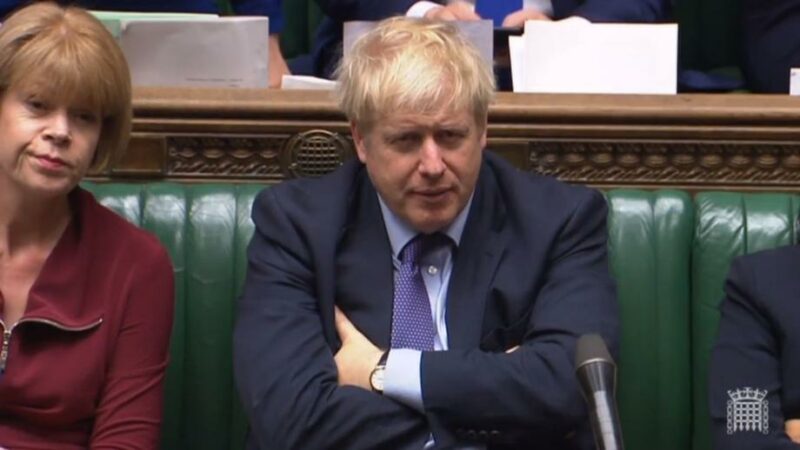The People's Vote campaign analyse Tuesday's historic events.

It was a pyrrhic victory for Boris Johnson on Tuesday, as his “die in a ditch” pledge to leave the EU by October 31 turned to dust.
He claimed to be “joyful” that MPs had voted for the legislation for his Brexit plan at second reading, but that does not mean a majority to support his plan.
Many MPs voted for it simply so they could begin trying to amend it at the next stage. But in the subsequent vote, on the shockingly-short three-day timetable for the legislation, MPs voted resoundingly against the government – just 15 minutes after his notional win.
Boris Johnson’s response was to “pause” the legislation and reintroduce the Queen’s Speech, which will be debated today, while they try to work out a new way of bludgeoning the deal through Parliament.
Pressure on MPs has made a huge difference. More than 319,000 people signed the People’s Vote letter from the People to the Powerful demanding a Final Say on Brexit.
Hitting the buffers
Boris Johnson is in office but not in power. That’s how his backbench colleague and Brexit hardliner Andrew Bridgen MP described the Prime Minister to any camera crew he could find last night.
And it’s true. Johnson’s desperate attempt to steamroller a Brexit for the rich, the right and the reckless in three days was stopped in its tracks by the regular Opposition parties plus those he has betrayed – the DUP and nine patriotic Conservative independents like Philip Hammond and Rory Stewart.
They wanted – quite reasonably – to debate and amend a deal that included a border down the Irish Sea with all its attendant customs bureaucracy, the end of European arrest warrants in many cases, deregulation of work, environment and food regulations and a trapdoor to No Deal at the end of the transition period in December 2020.
The EU has little option but to grant an extension now, as Donald Tusk indicated last night. Johnson will probably try to break free of being a Downing Street hostage to go for a general election, using a “people versus parliament” lie as his rallying cry.
But he doesn’t have the power to decide: it is up to Parliament alone to decide what happens next.
As Margaret Beckett MP, co-chair of the People’s Vote political committee, said: “Like many on both sides of the House of Commons, I do not regard a General Election as any way to decide an issue of this magnitude. It would confuse Brexit with every other issue under the sun and could well merely result in another hung parliament. It would neither end the chaos – or the arguments.”
The only democratic way to settle this once and for all is through a confirmatory referendum that offers a clear choice between the best Brexit deal Parliament can agree or staying in the EU.
Decision time for Labour
The Labour leadership continues to wrangle over the best next steps in the Brexit drama with Shadow Cabinet arguments on whether to go first for a general election or Final Say referendum.
Despite leading Cabinet members John McDonnell, Keir Starmer, Emily Thornberry and Diane Abbott telling our million-people London march on Saturday that they are backing a People’s Vote, Jeremy Corbyn and other colleagues seem to want an election first.
A spokesman said last night that the party’s position was “extension, then election”, according to the Guardian, but there were clashes between different sides. The fact that Boris Johnson is so desperate to bounce Labour into an election should give pause for thought.
Brexit effect worse than expected
The Brexit effect on the UK economy may be much worse than already predicted, according to a survey by the Confederation of British Industry.
The prospect of leaving the EU with No Deal led a majority of factory owners to cut investment for the coming year, while a slew of corporate insolvencies, company profit warnings and a gloomy manufacturing investment forecast is sparking concerns over the next year.
The CBI survey showed firms are planning to scale back purchases of new machinery and IT equipment at rate not seen since the 2008 financial crisis. Meanwhile, the number of companies going bust in the last three months jumped 35% on the previous quarter to the highest level since 2013.
The gloomy outlook follows months of failed lobbying by manufacturers for the government to agree the closest possible alignment with the EU as part of any Brexit deal.
With the government’s timetable falling apart, the economy at huge risk and a General Election unlikely to solve this mess – it’s clear that Brexit must be put back to the people.




2 Responses to “How Johnson’s “die in a ditch” pledge turned to dust”
Rachel Lever
The question posed (does the left prefer a 2nd Ref now to a Gen Election) does not consider the effect of one over the other. A 2nd Ref now will likely polarise the country more and permanently lose Labour its Leave voters. Whereas with a GE first we can re-focus the mood onto social and class issues and enable a more complex conversation about Brexit than Remain vs Leave. If we win it we would be in control of the Brexit thing, able to create a less damaging compromise and then move on. Paradoxically “getting Brexit done” first will leave its stamp on us for a generation, whereas putting it off while we focus on social matters could reduce its long term impact even though it means delay.
Michael Steane
Funny thing is we had a general election and it was the Labour Party that died in a ditch.